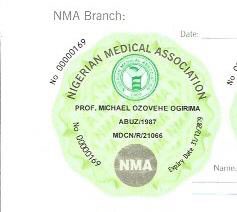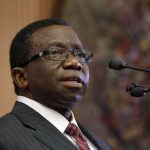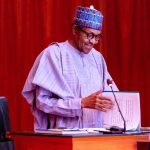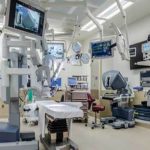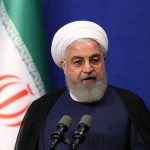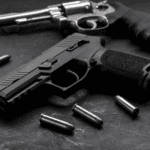 As a way of stemming quackery in the health sector, the Nigerian Medical Association (NMA) has
As a way of stemming quackery in the health sector, the Nigerian Medical Association (NMA) has
launched the Nigerian Doctor’s Stamp. ”With this, when you see a medical report, check if they bear the #NMAStamp. That’s our mark of authenticity. Its war against quackery!” This innovation which has been endorsed by the health minister, Prof Isaac Adewole, the association said will be “very affordable and accessible”.
“Once you’re a verifiable Nigerian Doctor, ask and you shall be given,” NMA said.
“It’s for all Nigerian Doctors. No chief, no junior! And yes, it’ll work, we’re positive,” the association said.
Here’s what the stamp looks like:
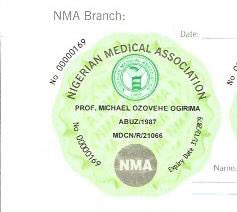
Matters arising
For the commendable innovation to be highly effective, an aggressive awareness campaign would be needed to inform patients about its existence and how to go about identifying and making use of it. Furthermore, since it would only be on medical reports, it may not really have much impacts on
clinical practice since only a small fraction of individuals seeking healthcare in Nigeria are requesting for medical reports.
There’s also the problem of counterfeiting. Once this is pitched as the tool for identifying authentic doctors, it would not take much time before fake ones become available and ubiquitous. An expert on Corel Draw said the stamp could be easily counterfeited if it doesn’t have extra security features as minimal design skills are needed to design it.
In the truest sense, the effects of quackery are best felt at private health centers taking care of patients during desperate life-dependent periods, not really when obtaining medical reports. More so, in Nigeria, organizations and others who request for medical reports often demand that such should be obtained from government-owned hospitals where quackery is rarely encountered.
I asked a couple of doctors about their thoughts on the new stamp. At first, several were happy about the innovation but drew my attention to the fact that it is not going to be free – and as such, it could be another revenue generation drive for the NMA since it is not free and would also be subject to periodical renewal.
Another issue of concern regarding the deployment of the NMA Stamp is its legality. While the association can make it binding for all its members, it may clash with the Medical and Dental Council of Nigeria in enforcing it in clinical practice in Nigeria.
Constitutionally, “no one is under the obligation of doing, or not doing, something, unless the Law says so”. That is to say that, the physician, as any Nigerian citizen, is allowed to practice that which is not prohibited by law or that do not have a special way of being done. Thus, writing a medical report without using one’s medical stamp should be considered illegal only if the law prohibits it. Presently, it does not.
The Code of Ethics of the Medical and Dental Council of Nigeria available here does not contain any articles requiring the use of medical stamps in medical documents. Since under the ethical and legal point of view, the use of the medical stamp is not mandatory, a review would be necessary. This shouldn’t be an issue though, since NMA would have carried the council along in its plans.
Furthermore, what happens to qualified doctors that refuse to signup for the stamp? Will their license be seized? This also shouldn’t be an issue since a cross section of doctors that had responded to the stamp were ecstatic about the fact that the NMA is taking steps towards tackling quackery in the health sector.
Ideally speaking
This innovation ought not to be the sole project of the NMA only. Instead, it ought to be one that is carried out by all health professionals’ associations in Nigeria since they are all affected and somehow threatened by quacks and quackery in the discharge of their professional duties. However, there’s love lost among the health professionals.
Yet again, this may not be an issue since other health bodies too have similar problems and would be watching closely to see what happens to the NMA Stamp before rolling out theirs.
By and large, this is a step in the right direction. But it is not enough to end quackery in the Nigerian health sector.
 As a way of stemming quackery in the health sector, the Nigerian Medical Association (NMA) has
As a way of stemming quackery in the health sector, the Nigerian Medical Association (NMA) has
launched the Nigerian Doctor’s Stamp. ”With this, when you see a medical report, check if they bear the #NMAStamp. That’s our mark of authenticity. Its war against quackery!” This innovation which has been endorsed by the health minister, Prof Isaac Adewole, the association said will be “very affordable and accessible”.
“Once you’re a verifiable Nigerian Doctor, ask and you shall be given,” NMA said.
“It’s for all Nigerian Doctors. No chief, no junior! And yes, it’ll work, we’re positive,” the association said.
Here’s what the stamp looks like:

Matters arising
For the commendable innovation to be highly effective, an aggressive awareness campaign would be needed to inform patients about its existence and how to go about identifying and making use of it. Furthermore, since it would only be on medical reports, it may not really have much impacts on
clinical practice since only a small fraction of individuals seeking healthcare in Nigeria are requesting for medical reports.
There’s also the problem of counterfeiting. Once this is pitched as the tool for identifying authentic doctors, it would not take much time before fake ones become available and ubiquitous. An expert on Corel Draw said the stamp could be easily counterfeited if it doesn’t have extra security features as minimal design skills are needed to design it.
In the truest sense, the effects of quackery are best felt at private health centers taking care of patients during desperate life-dependent periods, not really when obtaining medical reports. More so, in Nigeria, organizations and others who request for medical reports often demand that such should be obtained from government-owned hospitals where quackery is rarely encountered.
I asked a couple of doctors about their thoughts on the new stamp. At first, several were happy about the innovation but drew my attention to the fact that it is not going to be free – and as such, it could be another revenue generation drive for the NMA since it is not free and would also be subject to periodical renewal.
Another issue of concern regarding the deployment of the NMA Stamp is its legality. While the association can make it binding for all its members, it may clash with the Medical and Dental Council of Nigeria in enforcing it in clinical practice in Nigeria.
Constitutionally, “no one is under the obligation of doing, or not doing, something, unless the Law says so”. That is to say that, the physician, as any Nigerian citizen, is allowed to practice that which is not prohibited by law or that do not have a special way of being done. Thus, writing a medical report without using one’s medical stamp should be considered illegal only if the law prohibits it. Presently, it does not.
The Code of Ethics of the Medical and Dental Council of Nigeria available here does not contain any articles requiring the use of medical stamps in medical documents. Since under the ethical and legal point of view, the use of the medical stamp is not mandatory, a review would be necessary. This shouldn’t be an issue though, since NMA would have carried the council along in its plans.
Furthermore, what happens to qualified doctors that refuse to signup for the stamp? Will their license be seized? This also shouldn’t be an issue since a cross section of doctors that had responded to the stamp were ecstatic about the fact that the NMA is taking steps towards tackling quackery in the health sector.
Ideally speaking
This innovation ought not to be the sole project of the NMA only. Instead, it ought to be one that is carried out by all health professionals’ associations in Nigeria since they are all affected and somehow threatened by quacks and quackery in the discharge of their professional duties. However, there’s love lost among the health professionals.
Yet again, this may not be an issue since other health bodies too have similar problems and would be watching closely to see what happens to the NMA Stamp before rolling out theirs.
By and large, this is a step in the right direction. But it is not enough to end quackery in the Nigerian health sector.
 As a way of stemming quackery in the health sector, the Nigerian Medical Association (NMA) has
As a way of stemming quackery in the health sector, the Nigerian Medical Association (NMA) has
launched the Nigerian Doctor’s Stamp. ”With this, when you see a medical report, check if they bear the #NMAStamp. That’s our mark of authenticity. Its war against quackery!” This innovation which has been endorsed by the health minister, Prof Isaac Adewole, the association said will be “very affordable and accessible”.
“Once you’re a verifiable Nigerian Doctor, ask and you shall be given,” NMA said.
“It’s for all Nigerian Doctors. No chief, no junior! And yes, it’ll work, we’re positive,” the association said.
Here’s what the stamp looks like:

Matters arising
For the commendable innovation to be highly effective, an aggressive awareness campaign would be needed to inform patients about its existence and how to go about identifying and making use of it. Furthermore, since it would only be on medical reports, it may not really have much impacts on
clinical practice since only a small fraction of individuals seeking healthcare in Nigeria are requesting for medical reports.
There’s also the problem of counterfeiting. Once this is pitched as the tool for identifying authentic doctors, it would not take much time before fake ones become available and ubiquitous. An expert on Corel Draw said the stamp could be easily counterfeited if it doesn’t have extra security features as minimal design skills are needed to design it.
In the truest sense, the effects of quackery are best felt at private health centers taking care of patients during desperate life-dependent periods, not really when obtaining medical reports. More so, in Nigeria, organizations and others who request for medical reports often demand that such should be obtained from government-owned hospitals where quackery is rarely encountered.
I asked a couple of doctors about their thoughts on the new stamp. At first, several were happy about the innovation but drew my attention to the fact that it is not going to be free – and as such, it could be another revenue generation drive for the NMA since it is not free and would also be subject to periodical renewal.
Another issue of concern regarding the deployment of the NMA Stamp is its legality. While the association can make it binding for all its members, it may clash with the Medical and Dental Council of Nigeria in enforcing it in clinical practice in Nigeria.
Constitutionally, “no one is under the obligation of doing, or not doing, something, unless the Law says so”. That is to say that, the physician, as any Nigerian citizen, is allowed to practice that which is not prohibited by law or that do not have a special way of being done. Thus, writing a medical report without using one’s medical stamp should be considered illegal only if the law prohibits it. Presently, it does not.
The Code of Ethics of the Medical and Dental Council of Nigeria available here does not contain any articles requiring the use of medical stamps in medical documents. Since under the ethical and legal point of view, the use of the medical stamp is not mandatory, a review would be necessary. This shouldn’t be an issue though, since NMA would have carried the council along in its plans.
Furthermore, what happens to qualified doctors that refuse to signup for the stamp? Will their license be seized? This also shouldn’t be an issue since a cross section of doctors that had responded to the stamp were ecstatic about the fact that the NMA is taking steps towards tackling quackery in the health sector.
Ideally speaking
This innovation ought not to be the sole project of the NMA only. Instead, it ought to be one that is carried out by all health professionals’ associations in Nigeria since they are all affected and somehow threatened by quacks and quackery in the discharge of their professional duties. However, there’s love lost among the health professionals.
Yet again, this may not be an issue since other health bodies too have similar problems and would be watching closely to see what happens to the NMA Stamp before rolling out theirs.
By and large, this is a step in the right direction. But it is not enough to end quackery in the Nigerian health sector.
 As a way of stemming quackery in the health sector, the Nigerian Medical Association (NMA) has
As a way of stemming quackery in the health sector, the Nigerian Medical Association (NMA) has
launched the Nigerian Doctor’s Stamp. ”With this, when you see a medical report, check if they bear the #NMAStamp. That’s our mark of authenticity. Its war against quackery!” This innovation which has been endorsed by the health minister, Prof Isaac Adewole, the association said will be “very affordable and accessible”.
“Once you’re a verifiable Nigerian Doctor, ask and you shall be given,” NMA said.
“It’s for all Nigerian Doctors. No chief, no junior! And yes, it’ll work, we’re positive,” the association said.
Here’s what the stamp looks like:

Matters arising
For the commendable innovation to be highly effective, an aggressive awareness campaign would be needed to inform patients about its existence and how to go about identifying and making use of it. Furthermore, since it would only be on medical reports, it may not really have much impacts on
clinical practice since only a small fraction of individuals seeking healthcare in Nigeria are requesting for medical reports.
There’s also the problem of counterfeiting. Once this is pitched as the tool for identifying authentic doctors, it would not take much time before fake ones become available and ubiquitous. An expert on Corel Draw said the stamp could be easily counterfeited if it doesn’t have extra security features as minimal design skills are needed to design it.
In the truest sense, the effects of quackery are best felt at private health centers taking care of patients during desperate life-dependent periods, not really when obtaining medical reports. More so, in Nigeria, organizations and others who request for medical reports often demand that such should be obtained from government-owned hospitals where quackery is rarely encountered.
I asked a couple of doctors about their thoughts on the new stamp. At first, several were happy about the innovation but drew my attention to the fact that it is not going to be free – and as such, it could be another revenue generation drive for the NMA since it is not free and would also be subject to periodical renewal.
Another issue of concern regarding the deployment of the NMA Stamp is its legality. While the association can make it binding for all its members, it may clash with the Medical and Dental Council of Nigeria in enforcing it in clinical practice in Nigeria.
Constitutionally, “no one is under the obligation of doing, or not doing, something, unless the Law says so”. That is to say that, the physician, as any Nigerian citizen, is allowed to practice that which is not prohibited by law or that do not have a special way of being done. Thus, writing a medical report without using one’s medical stamp should be considered illegal only if the law prohibits it. Presently, it does not.
The Code of Ethics of the Medical and Dental Council of Nigeria available here does not contain any articles requiring the use of medical stamps in medical documents. Since under the ethical and legal point of view, the use of the medical stamp is not mandatory, a review would be necessary. This shouldn’t be an issue though, since NMA would have carried the council along in its plans.
Furthermore, what happens to qualified doctors that refuse to signup for the stamp? Will their license be seized? This also shouldn’t be an issue since a cross section of doctors that had responded to the stamp were ecstatic about the fact that the NMA is taking steps towards tackling quackery in the health sector.
Ideally speaking
This innovation ought not to be the sole project of the NMA only. Instead, it ought to be one that is carried out by all health professionals’ associations in Nigeria since they are all affected and somehow threatened by quacks and quackery in the discharge of their professional duties. However, there’s love lost among the health professionals.
Yet again, this may not be an issue since other health bodies too have similar problems and would be watching closely to see what happens to the NMA Stamp before rolling out theirs.
By and large, this is a step in the right direction. But it is not enough to end quackery in the Nigerian health sector.
 As a way of stemming quackery in the health sector, the Nigerian Medical Association (NMA) has
As a way of stemming quackery in the health sector, the Nigerian Medical Association (NMA) has
launched the Nigerian Doctor’s Stamp. ”With this, when you see a medical report, check if they bear the #NMAStamp. That’s our mark of authenticity. Its war against quackery!” This innovation which has been endorsed by the health minister, Prof Isaac Adewole, the association said will be “very affordable and accessible”.
“Once you’re a verifiable Nigerian Doctor, ask and you shall be given,” NMA said.
“It’s for all Nigerian Doctors. No chief, no junior! And yes, it’ll work, we’re positive,” the association said.
Here’s what the stamp looks like:

Matters arising
For the commendable innovation to be highly effective, an aggressive awareness campaign would be needed to inform patients about its existence and how to go about identifying and making use of it. Furthermore, since it would only be on medical reports, it may not really have much impacts on
clinical practice since only a small fraction of individuals seeking healthcare in Nigeria are requesting for medical reports.
There’s also the problem of counterfeiting. Once this is pitched as the tool for identifying authentic doctors, it would not take much time before fake ones become available and ubiquitous. An expert on Corel Draw said the stamp could be easily counterfeited if it doesn’t have extra security features as minimal design skills are needed to design it.
In the truest sense, the effects of quackery are best felt at private health centers taking care of patients during desperate life-dependent periods, not really when obtaining medical reports. More so, in Nigeria, organizations and others who request for medical reports often demand that such should be obtained from government-owned hospitals where quackery is rarely encountered.
I asked a couple of doctors about their thoughts on the new stamp. At first, several were happy about the innovation but drew my attention to the fact that it is not going to be free – and as such, it could be another revenue generation drive for the NMA since it is not free and would also be subject to periodical renewal.
Another issue of concern regarding the deployment of the NMA Stamp is its legality. While the association can make it binding for all its members, it may clash with the Medical and Dental Council of Nigeria in enforcing it in clinical practice in Nigeria.
Constitutionally, “no one is under the obligation of doing, or not doing, something, unless the Law says so”. That is to say that, the physician, as any Nigerian citizen, is allowed to practice that which is not prohibited by law or that do not have a special way of being done. Thus, writing a medical report without using one’s medical stamp should be considered illegal only if the law prohibits it. Presently, it does not.
The Code of Ethics of the Medical and Dental Council of Nigeria available here does not contain any articles requiring the use of medical stamps in medical documents. Since under the ethical and legal point of view, the use of the medical stamp is not mandatory, a review would be necessary. This shouldn’t be an issue though, since NMA would have carried the council along in its plans.
Furthermore, what happens to qualified doctors that refuse to signup for the stamp? Will their license be seized? This also shouldn’t be an issue since a cross section of doctors that had responded to the stamp were ecstatic about the fact that the NMA is taking steps towards tackling quackery in the health sector.
Ideally speaking
This innovation ought not to be the sole project of the NMA only. Instead, it ought to be one that is carried out by all health professionals’ associations in Nigeria since they are all affected and somehow threatened by quacks and quackery in the discharge of their professional duties. However, there’s love lost among the health professionals.
Yet again, this may not be an issue since other health bodies too have similar problems and would be watching closely to see what happens to the NMA Stamp before rolling out theirs.
By and large, this is a step in the right direction. But it is not enough to end quackery in the Nigerian health sector.
 As a way of stemming quackery in the health sector, the Nigerian Medical Association (NMA) has
As a way of stemming quackery in the health sector, the Nigerian Medical Association (NMA) has
launched the Nigerian Doctor’s Stamp. ”With this, when you see a medical report, check if they bear the #NMAStamp. That’s our mark of authenticity. Its war against quackery!” This innovation which has been endorsed by the health minister, Prof Isaac Adewole, the association said will be “very affordable and accessible”.
“Once you’re a verifiable Nigerian Doctor, ask and you shall be given,” NMA said.
“It’s for all Nigerian Doctors. No chief, no junior! And yes, it’ll work, we’re positive,” the association said.
Here’s what the stamp looks like:

Matters arising
For the commendable innovation to be highly effective, an aggressive awareness campaign would be needed to inform patients about its existence and how to go about identifying and making use of it. Furthermore, since it would only be on medical reports, it may not really have much impacts on
clinical practice since only a small fraction of individuals seeking healthcare in Nigeria are requesting for medical reports.
There’s also the problem of counterfeiting. Once this is pitched as the tool for identifying authentic doctors, it would not take much time before fake ones become available and ubiquitous. An expert on Corel Draw said the stamp could be easily counterfeited if it doesn’t have extra security features as minimal design skills are needed to design it.
In the truest sense, the effects of quackery are best felt at private health centers taking care of patients during desperate life-dependent periods, not really when obtaining medical reports. More so, in Nigeria, organizations and others who request for medical reports often demand that such should be obtained from government-owned hospitals where quackery is rarely encountered.
I asked a couple of doctors about their thoughts on the new stamp. At first, several were happy about the innovation but drew my attention to the fact that it is not going to be free – and as such, it could be another revenue generation drive for the NMA since it is not free and would also be subject to periodical renewal.
Another issue of concern regarding the deployment of the NMA Stamp is its legality. While the association can make it binding for all its members, it may clash with the Medical and Dental Council of Nigeria in enforcing it in clinical practice in Nigeria.
Constitutionally, “no one is under the obligation of doing, or not doing, something, unless the Law says so”. That is to say that, the physician, as any Nigerian citizen, is allowed to practice that which is not prohibited by law or that do not have a special way of being done. Thus, writing a medical report without using one’s medical stamp should be considered illegal only if the law prohibits it. Presently, it does not.
The Code of Ethics of the Medical and Dental Council of Nigeria available here does not contain any articles requiring the use of medical stamps in medical documents. Since under the ethical and legal point of view, the use of the medical stamp is not mandatory, a review would be necessary. This shouldn’t be an issue though, since NMA would have carried the council along in its plans.
Furthermore, what happens to qualified doctors that refuse to signup for the stamp? Will their license be seized? This also shouldn’t be an issue since a cross section of doctors that had responded to the stamp were ecstatic about the fact that the NMA is taking steps towards tackling quackery in the health sector.
Ideally speaking
This innovation ought not to be the sole project of the NMA only. Instead, it ought to be one that is carried out by all health professionals’ associations in Nigeria since they are all affected and somehow threatened by quacks and quackery in the discharge of their professional duties. However, there’s love lost among the health professionals.
Yet again, this may not be an issue since other health bodies too have similar problems and would be watching closely to see what happens to the NMA Stamp before rolling out theirs.
By and large, this is a step in the right direction. But it is not enough to end quackery in the Nigerian health sector.
 As a way of stemming quackery in the health sector, the Nigerian Medical Association (NMA) has
As a way of stemming quackery in the health sector, the Nigerian Medical Association (NMA) has
launched the Nigerian Doctor’s Stamp. ”With this, when you see a medical report, check if they bear the #NMAStamp. That’s our mark of authenticity. Its war against quackery!” This innovation which has been endorsed by the health minister, Prof Isaac Adewole, the association said will be “very affordable and accessible”.
“Once you’re a verifiable Nigerian Doctor, ask and you shall be given,” NMA said.
“It’s for all Nigerian Doctors. No chief, no junior! And yes, it’ll work, we’re positive,” the association said.
Here’s what the stamp looks like:

Matters arising
For the commendable innovation to be highly effective, an aggressive awareness campaign would be needed to inform patients about its existence and how to go about identifying and making use of it. Furthermore, since it would only be on medical reports, it may not really have much impacts on
clinical practice since only a small fraction of individuals seeking healthcare in Nigeria are requesting for medical reports.
There’s also the problem of counterfeiting. Once this is pitched as the tool for identifying authentic doctors, it would not take much time before fake ones become available and ubiquitous. An expert on Corel Draw said the stamp could be easily counterfeited if it doesn’t have extra security features as minimal design skills are needed to design it.
In the truest sense, the effects of quackery are best felt at private health centers taking care of patients during desperate life-dependent periods, not really when obtaining medical reports. More so, in Nigeria, organizations and others who request for medical reports often demand that such should be obtained from government-owned hospitals where quackery is rarely encountered.
I asked a couple of doctors about their thoughts on the new stamp. At first, several were happy about the innovation but drew my attention to the fact that it is not going to be free – and as such, it could be another revenue generation drive for the NMA since it is not free and would also be subject to periodical renewal.
Another issue of concern regarding the deployment of the NMA Stamp is its legality. While the association can make it binding for all its members, it may clash with the Medical and Dental Council of Nigeria in enforcing it in clinical practice in Nigeria.
Constitutionally, “no one is under the obligation of doing, or not doing, something, unless the Law says so”. That is to say that, the physician, as any Nigerian citizen, is allowed to practice that which is not prohibited by law or that do not have a special way of being done. Thus, writing a medical report without using one’s medical stamp should be considered illegal only if the law prohibits it. Presently, it does not.
The Code of Ethics of the Medical and Dental Council of Nigeria available here does not contain any articles requiring the use of medical stamps in medical documents. Since under the ethical and legal point of view, the use of the medical stamp is not mandatory, a review would be necessary. This shouldn’t be an issue though, since NMA would have carried the council along in its plans.
Furthermore, what happens to qualified doctors that refuse to signup for the stamp? Will their license be seized? This also shouldn’t be an issue since a cross section of doctors that had responded to the stamp were ecstatic about the fact that the NMA is taking steps towards tackling quackery in the health sector.
Ideally speaking
This innovation ought not to be the sole project of the NMA only. Instead, it ought to be one that is carried out by all health professionals’ associations in Nigeria since they are all affected and somehow threatened by quacks and quackery in the discharge of their professional duties. However, there’s love lost among the health professionals.
Yet again, this may not be an issue since other health bodies too have similar problems and would be watching closely to see what happens to the NMA Stamp before rolling out theirs.
By and large, this is a step in the right direction. But it is not enough to end quackery in the Nigerian health sector.
 As a way of stemming quackery in the health sector, the Nigerian Medical Association (NMA) has
As a way of stemming quackery in the health sector, the Nigerian Medical Association (NMA) has
launched the Nigerian Doctor’s Stamp. ”With this, when you see a medical report, check if they bear the #NMAStamp. That’s our mark of authenticity. Its war against quackery!” This innovation which has been endorsed by the health minister, Prof Isaac Adewole, the association said will be “very affordable and accessible”.
“Once you’re a verifiable Nigerian Doctor, ask and you shall be given,” NMA said.
“It’s for all Nigerian Doctors. No chief, no junior! And yes, it’ll work, we’re positive,” the association said.
Here’s what the stamp looks like:

Matters arising
For the commendable innovation to be highly effective, an aggressive awareness campaign would be needed to inform patients about its existence and how to go about identifying and making use of it. Furthermore, since it would only be on medical reports, it may not really have much impacts on
clinical practice since only a small fraction of individuals seeking healthcare in Nigeria are requesting for medical reports.
There’s also the problem of counterfeiting. Once this is pitched as the tool for identifying authentic doctors, it would not take much time before fake ones become available and ubiquitous. An expert on Corel Draw said the stamp could be easily counterfeited if it doesn’t have extra security features as minimal design skills are needed to design it.
In the truest sense, the effects of quackery are best felt at private health centers taking care of patients during desperate life-dependent periods, not really when obtaining medical reports. More so, in Nigeria, organizations and others who request for medical reports often demand that such should be obtained from government-owned hospitals where quackery is rarely encountered.
I asked a couple of doctors about their thoughts on the new stamp. At first, several were happy about the innovation but drew my attention to the fact that it is not going to be free – and as such, it could be another revenue generation drive for the NMA since it is not free and would also be subject to periodical renewal.
Another issue of concern regarding the deployment of the NMA Stamp is its legality. While the association can make it binding for all its members, it may clash with the Medical and Dental Council of Nigeria in enforcing it in clinical practice in Nigeria.
Constitutionally, “no one is under the obligation of doing, or not doing, something, unless the Law says so”. That is to say that, the physician, as any Nigerian citizen, is allowed to practice that which is not prohibited by law or that do not have a special way of being done. Thus, writing a medical report without using one’s medical stamp should be considered illegal only if the law prohibits it. Presently, it does not.
The Code of Ethics of the Medical and Dental Council of Nigeria available here does not contain any articles requiring the use of medical stamps in medical documents. Since under the ethical and legal point of view, the use of the medical stamp is not mandatory, a review would be necessary. This shouldn’t be an issue though, since NMA would have carried the council along in its plans.
Furthermore, what happens to qualified doctors that refuse to signup for the stamp? Will their license be seized? This also shouldn’t be an issue since a cross section of doctors that had responded to the stamp were ecstatic about the fact that the NMA is taking steps towards tackling quackery in the health sector.
Ideally speaking
This innovation ought not to be the sole project of the NMA only. Instead, it ought to be one that is carried out by all health professionals’ associations in Nigeria since they are all affected and somehow threatened by quacks and quackery in the discharge of their professional duties. However, there’s love lost among the health professionals.
Yet again, this may not be an issue since other health bodies too have similar problems and would be watching closely to see what happens to the NMA Stamp before rolling out theirs.
By and large, this is a step in the right direction. But it is not enough to end quackery in the Nigerian health sector.

